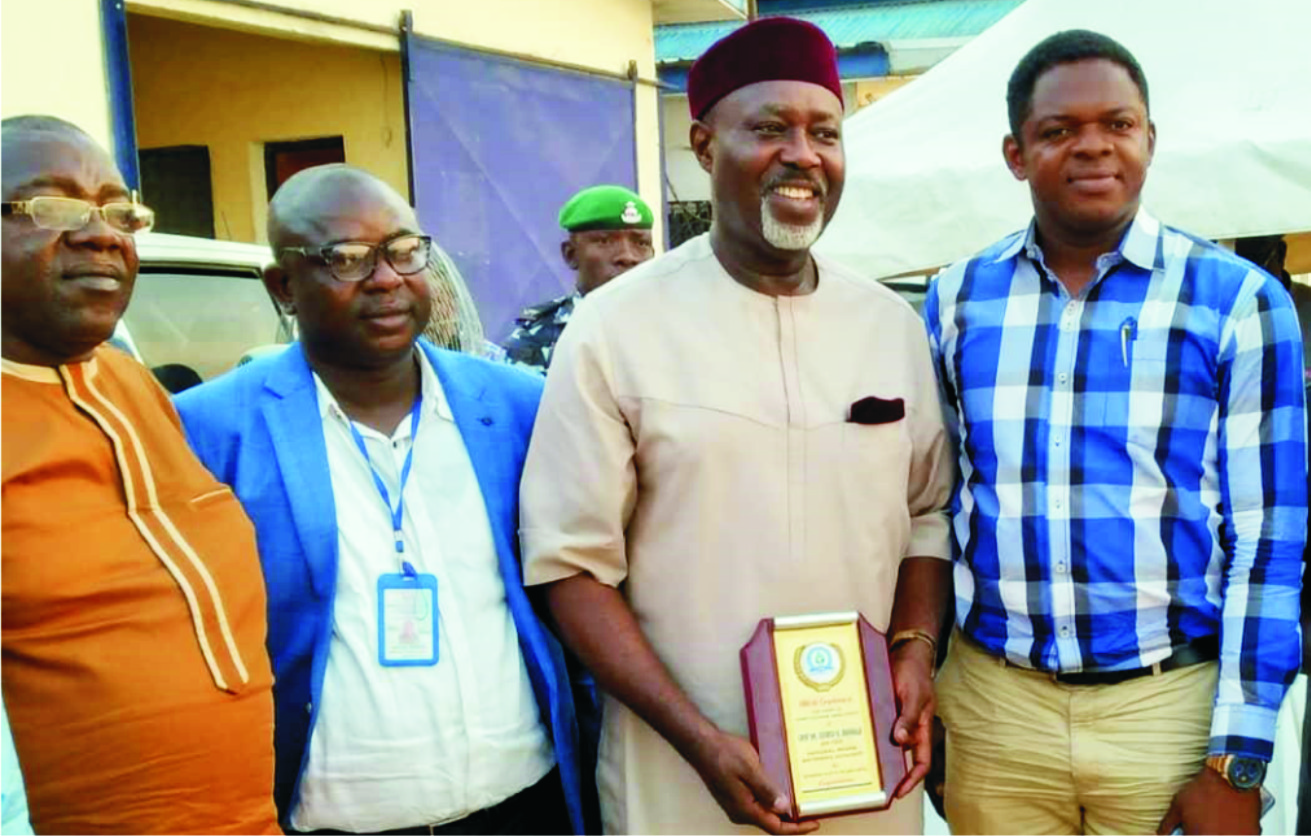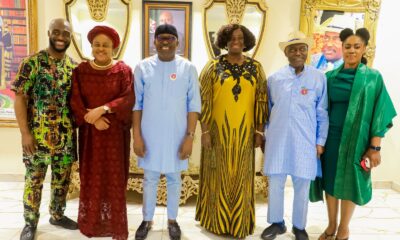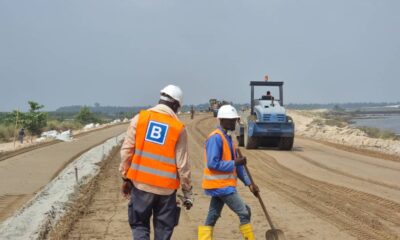Maritime
Customs Loses N2.3bn Daily To COVID-19

The Nigerian Customs Service (NCS) says the lockdown in Lagos State, arising from the Coronavirus pandemic has caused the service to lose its daily revenue of N2.3 billion in the state.
The lockdown was imposed by the Federal Government on Lagos State to curb the spread of the COVID-19 pandemic.
This was contained in a statement by NCS Public Relations Officer, Apapa Area Command, Nkiru Nwala.
Nwala disclosed that the Customs’ top three revenue generating commands namely the Apapa Area Command, Tin Can Island Port Area Command and PTML Area Command were collectively losing N2.3 billion daily to the lockdown.
She said the Apapa Area Command, which she described as the highest revenue collecting command of the NCS, recorded an average collection of N900 million daily as against its daily target of N1.8 billion.
Nwala noted that the effect of the lockdown would have been minimal on the command’s revenue generation if the banks had opened for operations.
“As you know, none of the activities in the port was stopped but the major issue here are the banks and there is little we can do without the banks. Duty payment is beyond online transaction, it has a whole lot of documentations that is required more than transfer.
“On Wednesday, we got N949million. If the banks were open, it would have been a bit different but I learnt the banks have been asked to open. Since the bank will be opened by weekend, I am sure the revenue will improve”, she said.
The Tin Can Island Port Command, which is the second highest Customs revenue collecting command, has also been recording a shortfall of N700million daily in its revenue collection since the lockdown, according to its spokesman, Uche Ejesieme.
“Before now, we are on the average of N1.5 billion to 1.7 billion daily but I don’t think we are making that much now. For now, we are between N800 and N900 million daily collections since the lockdown.
“We hope that by the time the bulk operators that pay in bulk come in, it is going to boost our revenue.
“The major problem is because the banks are not working despite the directive that they should work. The agents confirm that they can’t even do a single transaction in the banks. The jobs are interwoven; one agency cannot operate without the other. The situation expectedly has affected revenue generation.
“Beyond the fact that some of the agents cannot go to the banks to pay, some are actually doing e-payment but if you look at the percentage of e-payment and manual, the difference is huge. We are hoping that sooner than later, some of the challenges will be ameliorated.
Also speaking, spokesman, PTML, Area Command, Tin Island Port Complex Yakubu Muhammed, said the lockdown has negatively impacted the revenue generation of the command as most of the agents cannot come over to lodge their declarations.
He said the command’s revenue declined from a daily collection of N900million to N189 million while number of declarations also dropped from 1300 daily to 100.
“Our daily official revenue target is N1 billion but on the average, we collect between N600 million and N900 million. If you look at what we have from Tuesday (last week) when the lock down started, the rate has really dropped”, he said.
Chinedu Wosu
Maritime
Waterways Safety: NIWA Wants Partnership With Govs

The Managing Director of National Inland Waterways Authority (NIWA), Mr. Bola Oyebamiji, has called for increased collaboration between the federal agency and state governments to enhance the safety and security of inland waterways transportation.
Speaking at a one-day consultative forum on safety and insecurities on inland waterways, organized by the Nigeria Transportation Commissioners’ Forum in Ilorin, Oyebamiji emphasized the critical role that safety and security play in fostering a thriving water transportation system.
The forum, themed “Prevalent Safety, Security Hazards and Practices in Inland Waterways: Passenger Transport Safety in Ilorin, Kwara State”, sought to address the pressing issues facing the inland waterways sector.
Oyebamiji acknowledged the ongoing efforts by NIWA to improve safety, such as the recent unveiling of the transportation code for public use, the inauguration of several operational assets including survey boats, gunboats, water ambulances, and a passenger ferry.
He also noted that safety campaigns have been launched across all operational bases, targeting local communities in their native languages.
The NIWA boss stated the support from the National Assembly, including the ongoing discussions on establishing coastal guards and the attention safety and security on inland waterways have received from the House Committee on Inland Waterways.
In his closing remarks, Oyebamiji appealed to the Commissioners for Transportation across relevant states to collaborate with NIWA in areas such as training, safety campaigns, infrastructure development, and financial empowerment.
He stressed that while the challenges are significant, they are surmountable through collective action.
Maritime
Coastal Guard Bill’ll Unlock Marine Blue Economy Potential -FG

The Federal Government has conveyed its support for the establishment of the National Coast Guard.
The Government also commended the proponents of the bill for having the hindsight to initiate a course of action that, when passed, will be the catalyst needed in unlocking the nation’s maritime potential.
In a statement by the Head of Press, and Public Relations for the ministry, Muhammad Tahir Zakari, Minister of Marine and Blue Economy, Adegboyega Oyetola, was reported to have made this known at the National Assembly complex at the 1-Day Public Hearing on National Coast Guard Bill (NCG).
The statement stated that the bill when passed, will guarantee maritime safety, sustainable marine resource development and enhance economic growth.
Highlighting the major need for the National Coast Guard, the Minister identified: Maritime safety; Environmental protection through enforcing environmental regulations and conservation of marine ecosystems; and Enforcement of civil maritime laws to uphold laws governing civil maritime activities and enforce fishing regulations while preventing illegal exploitation.
It also include search and rescue to maritime emergencies and also conduct timely search and rescue operations.
He cited a 2009 publication by the African Centre for Strategic Studies, which noted that 15 of the 21 independent maritime nations in sub-Saharan Africa have dedicated coast guards and identify themselves as such.
Despite this, none of these nations have Nigeria’s population or the extent of its inland waterways and coastline.
While acknowledging the significant role of the Nigerian Navy in safeguarding the Nigerian maritime space following the collaborative effort with the Ministry of Marine and Blue Economy in the Deep Blue Project, which has shown great results with zero piracy in Nigeria’s territorial water in the last three years.
He, however, stressed the need for the National Coast Guard to complement the efforts of the Nigerian Navy in playing a critical role in preventing accidents, crime, and other threats to maritime activities
“A vast coastline of 850 km, the equivalent of 10,000 km in two ways. It is also a place of rich and diverse economic sources.
“While these opportunities are promising, they also present challenges such as pollution, overfishing, and unsustainable use of marine resources. The proposed National Coast Guard is equipped to tackle these issues”, he stated.
He urged the Senate and the National Assembly to lend their full support to the bill, noting that, “Nigeria Coast Guard will act as a vital complement to the Navy, of fostering a safe and sustainable maritime environment”.
He appealed for the establishment of a flexible, adaptive implementation strategy that would evolve into a midwife for the bill to succeed, while urging those with reservations to see the pressing need of the institution.
Earlier during the hearing, the President of the Nigerian Senate, Godswill Akpabio, commended members of the Committee on Marine and Transport for their unwavering dedication in piloting the initiative and advocating for the establishment of the National Coast Guard Bill.
Akpabio, represented by Sen. Akintunde Yunus, said the essence of the bill was to make critical decisions that will guarantee the safety of the nation’s waterways and protect the marine resources.
He stated that “the establishment of the National Coast Guard is not merely a legislative formality, but a dire necessity”.
Speaking also, the Chairman, Senate Committee on Marine and Transport, Sen. Sanni Eshinlokun, said the Bill was first read in the Senate on the 3rd of October while the Senate at its plenary deliberated on the General Principles of the Bill.
Senator Eshinlokun said, “The Bill was read for the second time and referred to the Senate Committee on Marine Transport for further legislative action.
Maritime
Private Sector Should Drive Blue Economy -Bello

Former Executive Secretary of the Nigerian Shippers’ Council (NSC), Barr. Hassan Bello, has charged the Federal Government not to designate any of its agencies as the lead agency to drive the blue economy if it actually wants Nigeria to make progress in the sector.
Bello, who made this call in his remarks at the 10th anniversary, lecture and awards of the Primetime Reporters in Lagos, midweek, advised the Federal Government to avoid the mistake made during the Cabotage era when it designated an agency as lead agency and the rest was now history.
He said for the sector to succeed, it required everyone’s contribution, urging the Minister to allow the private sector to drive the blue economy.
According to him, “Two things which we must be very careful about is to make.mistake, like we did with cabotage. If we remember carefully, Cabotage was coastal and Inland shipping, but that inland shipping was not emphasized.
“It was just for supply of oil and gas to the mother vessel, we couldn’t trade as we were doing from Asaba to Baro in Niger State, or carry cement or even petroleum products. So, we cannot restrict that to customs.
“Secondly, don’t give the Blue Economy to an agency to say it is the lead agency because everybody must have contributions to the Blue Economy. As we want to do, we have seen agencies struggling to have seminars on Blue Economy, it’s not even a government thing.
“Allow the private sector to take over this blue economy, don’t create fantastic departments and overload into the private sector. This is what is our problem.
“When we had the Cabotage, it was a NIMASA thing and when you talk about Cabotage, no! don’t go there, what is your own with Cabotage? So, Cabotage was colonized, the Blue Economy should not be colonized. We should have the ramification of that Blue Economy to make sure that everything trickles down”.
He however, noted that there had been a lot of progress by the various organs of government even before the designation of the Blue Economy Ministry saying, “Blue Economy has always been there just as we had the red economy, which is characterized by China’s quest for export for state directed economy.
“We even have the grey economy, which is that which is informal. We have the green economy and all shades of economy. So, it’s not new that we have the Blue Economy, what has been the call by stakeholders is for us to have a ministry that will cater for transportation and transportation is a cardinal or even the paramount part of the Blue Economy.
“I know we have sustainable use of ocean resources and many other things, but when you talk about the Blue Economy, the central point is the use of ocean and the inland waterways and other resources for diversification of our economy as the Convener has said”.
“We have to be conscious, concerted and even calculated to make sure that it works for us. It’s not just fancy thing that there’s a ministry for blue economy. There must be active participation of stakeholders and the involvement of the private sector to harness the resources and not anything fancy or pretentious. The government must involve the private sector.
By: Stories by Nkpemenyie Mcdominic, Lagos
-

 News2 days ago
News2 days agoTinubu Mourns Ex-US President, Jimmy Carter
-

 News2 days ago
News2 days agoNigeria Has No Reason To Be Poor – Ooni
-

 News2 days ago
News2 days agoIN RIVERS, GOD REMAINS OUR ULTIMATE LIBERATOR – FUBARA
-

 News2 days ago
News2 days agoCHRISTMAS: FUBARA, WIFE HOST RIVERS CHILDREN, TASK THEM ON EXEMPLARY CONDUCT
-

 Nation5 days ago
Nation5 days agoBodo-Bonny Road: Julius Berger Workforce Maintains Steady Work to ensure timely delivery
-

 News2 days ago
News2 days agoFUBARA MOURNS FORMER RIVERS GOV
-

 Transport3 days ago
Transport3 days ago‘Poor State Of Road Affecting Onne Port’s Operations’
-

 News2 days ago
News2 days agoMayor Of Housing Wins Man Of The Year Award

